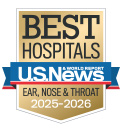Swallowing Disorders
Swallowing problems are common and costly. Dysphagia is the symptom of swallowing difficulty and some of its most common causes include acid reflux disease, advancing age, neurodegenerative disease, cricopharyngeus muscle dysfunction, food allergy and head and neck cancer.
Complications of swallowing disorders include dehydration, malnutrition, social isolation, pulmonary abscess, pneumonia, and death. We utilize an interdisciplinary approach with advanced diagnostics to develop individualized patient treatment plans and deliver the world’s most comprehensive care.
In order to improve care and patient quality of life, we have developed one of the world’s most dynamic aerodigestive research programs.
Some of our ongoing clinical research includes:
- Phase I clinical trial assessing muscle stem cell tongue therapy in head and neck cancer survivors
- Phase I clinical trial evaluating the safety of the swallow expansion device (SED)
- Multi-institutional phase I and 2 clinical trial studying objective swallowing outcomes in head and neck cancer patients treated with novel radiotherapy regimens
- Improvement in quality of life after narrow field laryngectomy for profound dysphagia
- Positive pressure device to improve bolus transit after total laryngectomy
- Long-term ability of fluoroscopic swallow study to predict morbidly from impairment
- Negative pressure in the esophagus to improve bolus transit through the hypopharynx
Conditions Treated
- Dysphagia
- Swallowing problems after:
- intracranial surgery
- head and neck surgery
- cervical spine surgery
- thoracic surgery
- stroke or trauma
- neurologic disease
- head and neck cancer
- chemoradiation therapy
- Swallowing problems from gastroesophageal reflux disease
- Chronic aspiration
- Impaired vocal fold mobility
- Cricopharyngeal muscle dysfunction
- Zenker's diverticulum
- Esophageal stenosis
- Esophageal dysmotility
Symptoms of Abnormal Swallowing
Indications of a swallowing disorder may include:
- Inability to swallow or extensive time required to swallow
- Frequent choking on food
- Hesitancy in swallowing food
- Coughing during or immediately after eating or drinking
- Inability to manage secretions
- Pain during swallowing
- Wet voice
- Recurring pneumonia
- Unexplained weight loss
- Regurgitation
- Heartburn
Causes of Abnormal Swallowing
Patients may suffer from swallowing or voice difficulties for a number of reasons, including:
- Stroke or other forms of acute neurological damage
- Head and neck cancers
- Radiation therapy to the neck
- Heart surgery or other chest surgery, which may lead to vocal cord weakening or paralysis
- Trauma to the throat or larynx
- Tracheostomy tubes
- Degenerative neurological disorders such as dementia (including Alzheimer's disease), multiple sclerosis, Parkinson's disease, or Lou Gehrig's disease (amyotrophic lateral sclerosis)
- Pharyngeal and esophageal sacs and pouches (diverticulum) and narrowing (stenosis)
- Age-related changes
Diagnosis and Treatment
Our highly-skilled clinicians use the world’s most sophisticated diagnostics to identify sources and severity of swallowing impairment. Many diagnostic procedures that previously required sedation in an operating room can now be administered in-clinic using topical anesthesia. Diagnostic studies are thoroughly reviewed by our multi-disciplinary team which develops individualized, comprehensive treatment plans.
Office Procedures
- Distal chip endoscopy: A video camera placed on the tip of the endoscope provides physicians with higher resolution, close-up images of the swallowing process and anatomy compared to traditional fiberoptic endoscopes.
- Fiberoptic endoscopic evaluation of swallowing FEES: A fiberoptic flexible endoscope is inserted through the nose while the physician observes the patient's swallowing anatomy and function as food of various consistencies is swallowed.
- Swallowing fluoroscopy: Our clinicians have pioneered the standardized evaluation of swallowing fluoroscopy and are among the most advanced performed in the world. During these studies, x-ray captures video of swallowing from the mouth through the stomach.
- In-office transnasal esophagoscopy: This procedure allows physicians to examine the entire swallowing apparatus -- from mouth to esophagus -- without sedating the patient. The procedure is quicker and safer than traditional esophagoscopy under sedation or general anesthesia. Biopsies can be taken as needed.
- High-resolution 3D esophageal manometry: This procedure provides the most comprehensive diagnosis of esophageal motility disorders. A thin-caliber probe containing numerous pressure sensors is passed through the nose and into the esophagus during the test.
Ambulatory pH testing
This testing provides objective data regarding esophageal exposure to acidic and non-acidic contents. Both wireless and hard-wired options are available.
- Vocal cord injection: Vocal fold paralysis leads to inadequate closure of the larynx, and during swallowing, this may cause choking or inadequate cough. In-office vocal fold injection augmentation can improve laryngeal closure so voice and swallowing capabilities can be quickly restored.
- Endoscopy with biopsy: Examination and biopsy of the pharynx, larynx, and esophagus can be performed in-office under topical anesthesia.
- Behavioral swallowing therapy: Swallowing rehabilitation is provided to appropriate candidates through biofeedback, compensatory maneuvers, surface electromyography, pulmonary clearance techniques, and exercise-based therapies. The clinic has extensive experience with swallowing therapy.
- Esophageal dilation: In some cases of esophageal stenosis, the esophagus can be dilated in-clinic (awake) or in the endoscopy suite (sedation). Our physicians have developed and implemented innovative techniques for dilation of the esophagus.
Operating room procedures
- Management of upper esophageal sphincter dysfunction, including endoscopic dilations, cricopharyngeal myotomy, and Zenker's Diverticulectomy.
- Procedures for laryngeal weakness and paralysis including thyroplasty, arytenoid adduction, laryngeal reinnervation
- Surgery for esophageal stenosis
- Surgery for intractable aspiration such as tracheostomy, laryngeal diversion procedures, hypopharyngoplasty, laryngeal elevation surgery
Unique approach to Swallowing Disorders
The Clinic's unique approach involves evaluation of patients with swallowing problems by both an otolaryngologist and a speech pathologist as needed in the same premises. Usually, these specialists work in separate clinics, requiring the patient to seek care in multiple locations. A comprehensive surgical, medical, or rehabilitation management plan, tailored to the individual patient, is then developed without delay. Quick targeted referrals are set up with neurologists, gastroenterologists, and thoracic surgeons especially interested in the care of patients with dysphagia. Each patient receives a personalized treatment and monitoring regimen based on his or her medical and personal needs.


